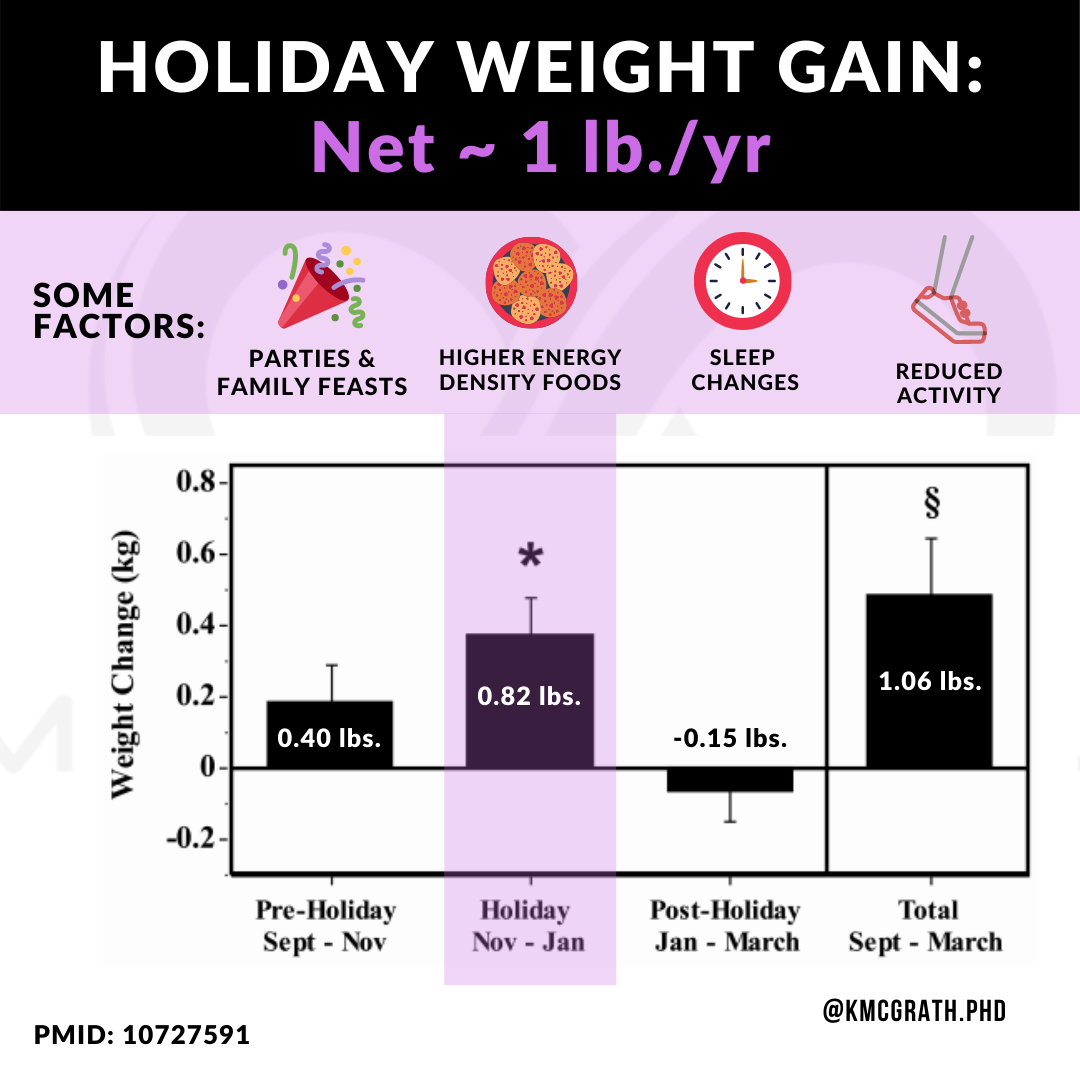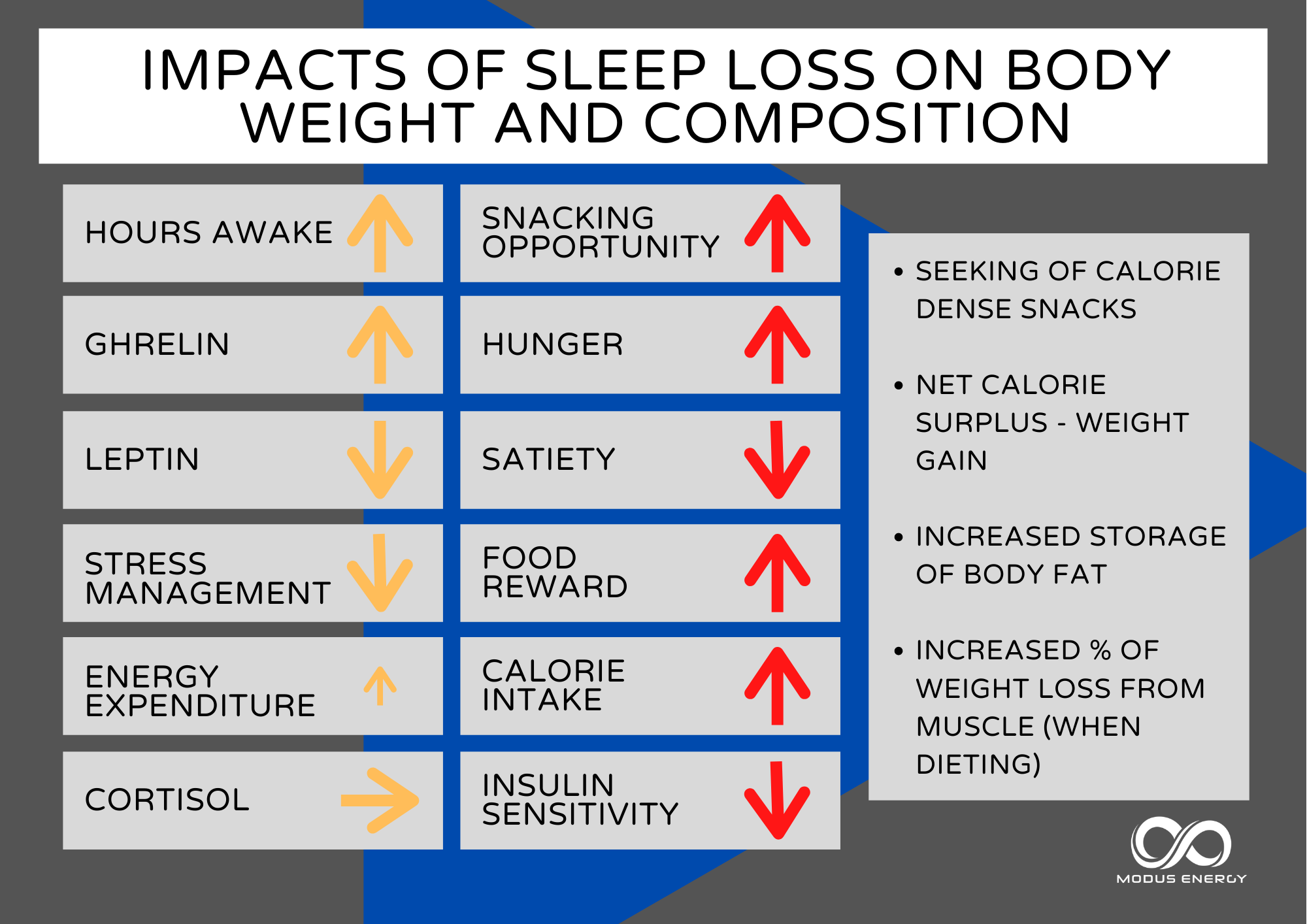
The winter season is golden opportunity to utilize healthy balance habits for weight management. This review provides context and recommendations regarding holiday weight gain.

Adults tend to gain weight throughout middle age at a rate of 1.1 – 2.2 lbs/year, [1] with the most significant acceleration occurring in the 20s and 30s. As we age, our energy needs tend to decrease. If our calorie intake remains the same (or increases) and calorie expenditure decreases, weight gain is inevitable. A small to modest accumulation of weight every year may have health implications. It’s a contributing factor to the growing US obesity rate. [2]
Individualized circumstances may contribute to weight gain at certain points in life. Major events can create stress, change in habits, and decrease time available for self-care. Major life events aside, is every day, week, and month throughout the year equivalent in terms of weight gain?
The winter holiday (Thanksgiving through 1st week of January) appears to be a key time for higher risk of weight gain. These winter weeks may contribute more towards long-term weight gain throughout adulthood. Let’s delineate between an acute weight spike related to a specific event, versus seasonal weight gain.
Acute Weight Gain (Temporary)

A weight spike following individual eating event – e.g. a party serving decadent food and drink is unlikely to be true gain of fat mass. If you see a 3+ lb. jump on the scale the following morning, there is good news. Unless you literally ate more than 10,000 Calories at the party, you did not gain 3+ lbs of fat or tissue. It’s mostly water!
- Increased carbohydrate consumption results in higher glycogen (sugar) stores in the muscles and liver. This leads to retention of additional water. Each gram of glycogen stored holds ~ 3g additional water.
- Increased consumption of sodium from salty foods increases water retention. This retention may come from free body water, independent of increased water intake.[3]
- Alcohol is a diuretic (makes you pee more) and it suppresses a hormone that tells your body to retain water. Your body is going to try to counterbalance by holding on to as much water as possible.[4,5]
- The human body is ~60% water, sometimes a bit more and sometimes a bit less depending on what we do. I spent my early years overanalyzing individual scale readings assuming they were tied exclusively to gain and loss of actual body tissue.
I recommend not weighing yourself the day after a big night out. After a few days back into your regular eating routine, your weight will return somewhere close to your pre-party weight. A single indulgent meal has little to no impact on the big picture.
Seasonal Weight Gain (Sustained)
In contrast to an acute weight spike, seasonal weight gain is attributed to sustained calorie surplus from continual over-eating during the holiday period. Higher availability of energy-dense snacks, and more frequent snacking on higher carbohydrate and higher fat foods contribute to gain of true body mass, specifically increased fat mass.

According to a prospective study on seasonal weight gain, Americans gain an average of 0.8 lbs through the period of November through early January.[6] Most weight gained during the holiday period is not subsequently lost, leading to a net gain of approximately 1 lb/year through the full study period.
Weight gain during the winter holiday period is not subsequently lost in a year, and represents more than 50% of the weight gained throughout the year.
Although the AVERAGE weight gain in the study population was 1 lb, segmentation of the data reveals that some participants had major holiday weight gain ( ≥ 5 lb). These individuals were more likely to already be overweight or obese.
Weight management through the holiday period may be even more important for those who are already at risk for obesity-related comorbid conditions.
Recommendations
Here are some recommendations to keep in mind through the winter to support healthy weight management:
- Set practical boundaries to create a healthy balance. It’s unrealistic to avoid ALL temptation and over-restrict during the holidays. Prioritize your special meals and treats and skip the less important foods. Be mindful of portions and eat slowly to maximize enjoyment.
- Self-monitor. Individuals who were provided weight management information, other support, and encouraged to self-monitor weight achieved better control of body weight versus those that did not self- monitor [7,8].
- Keep up with your training. An increase in food intake is the primary cause for seasonal weight gain (versus a decrease in activity), but keeping up with your regular routine will support your health. Don’t skip because it’s cold out. 🙂
- Reflect/journal on how you did with your nutrition through the holidays: assess how you physically and mentally feel, what habits you maintained and which you broke (if any), and seek support as needed to address gaps. The start of the year is a natural period to set new goals and focus areas.
Ready to improve your nutrition? Contact me for nutrition coaching.
[1] https://www.cdc.gov/nchs/data/series/sr_03/sr03_039.pdf
[2] https://www.cdc.gov/nchs/data/databriefs/db360-h.pdf
[3] Rakova N.; Kitada, K.; et al., Increased salt consumption induces body water conservation and decreases fluid intake, J Clin Invest., 127(5), 1932-1943 (2017).
[4] Eggleton M.G., The diuretic action of alcohol in man, J Physiol., 101(2), 172-91, (1942).
[5] Cederbaum A.I., Alcohol metabolism, Clin Liver Dis., 16(4), 667-85, (2012).
[6] Yanovski J.A.; Yanovski, S.Z., et al., A prospective study of holiday weight gain, N Engl J Med., 342(12), 861-7, (2000).
[7]Boutelle, K.N.; Baker, R.C.; et al., How can obese weight controllers minimize weight gain during the high risk holiday season? By self-monitoring very consistently, Health Psychology, 18(4), 364–368 (1999).
[8] Mason F.; Farley A.; et al., Effectiveness of a brief behavioural intervention to prevent weight gain over the Christmas holiday period: randomised controlled trial, BMJ, 363, (2018).
[9] Bhutani, S.; Wells, N., Change in eating pattern as a contributor to energy intake and weight gain during the winter holiday period in obese adults, Int J Obes, 44(7), 1586-1595, (2020).


